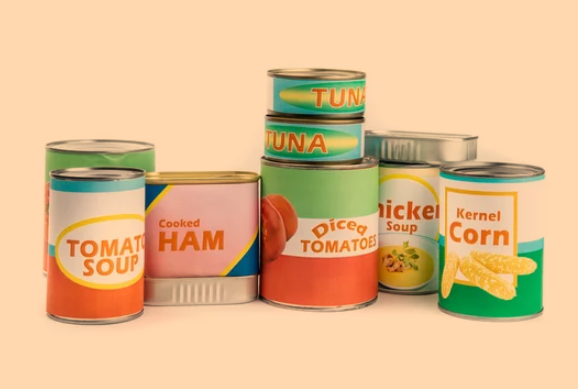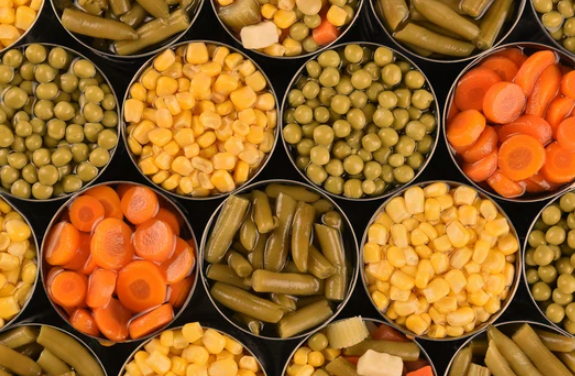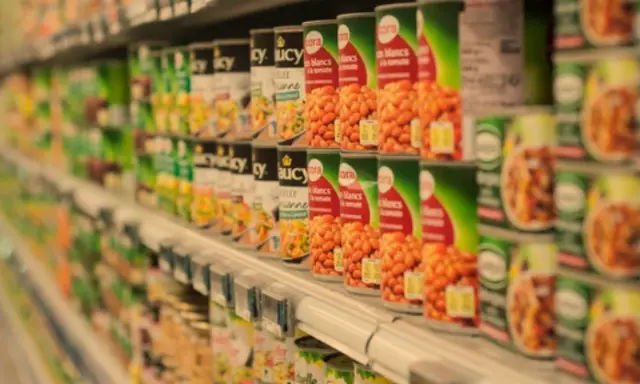Our pantries have long been stocked with canning supplies because they offer ease and a lengthy shelf life for a range of foods.
Whether it’s veggies, fruits, meats, or soups, canned foods provide a practical method to stock up on necessities and quickly put together delectable meals.
Have you ever considered the potential shelf life of these canned goods?
We’ll look at how long canned foods last, what influences how long they last, and how to make sure your tinned items are safe and of high quality in this complete guide.
Shelf Life: How Long Do Canned Goods Last?

The shelf life of canned goods can vary significantly depending on several factors, including the type of food, the canning process, storage conditions, and the presence of preservatives.
Generally, canned goods have a much longer shelf life compared to fresh or frozen foods. This is due to the canning process, which involves sealing the food in an airtight container to prevent the growth of microorganisms, such as bacteria, yeast, and molds, that can cause spoilage.
Most canned goods are stamped with a “best by” or “use by” date, which indicates the manufacturer’s estimate of how long the product will maintain its quality.
It’s essential to note that this date is not the same as an expiration date. Canned goods can often remain safe to eat for an extended period after the “best by” date, as long as they have been stored correctly.
However, the quality, flavor, and nutritional value may gradually deteriorate over time.
Factors Affecting Shelf Life

- Type of Food: The shelf life of canned goods varies depending on the type of food. Low-acid foods, such as vegetables, beans, and meats, typically have a longer shelf life than high-acid foods like tomatoes, citrus fruits, and fruit juices.
- Canning Process: The canning process itself plays a significant role in determining shelf life. Properly sealed cans that are free from defects are more likely to maintain the quality of the food for an extended period. Commercially canned goods undergo rigorous quality control to ensure safety and longevity.
- Storage Conditions: Proper storage is crucial for preserving the shelf life of canned goods. Store canned goods in a cool, dry place away from direct sunlight and extreme temperatures. The ideal storage temperature is between 50°F and 70°F (10°C to 21°C). Avoid storing canned goods in humid or damp environments, as moisture can lead to rust and compromise the seal.
- Preservatives: Some canned goods contain preservatives, such as sodium benzoate or citric acid, which can extend their shelf life. These additives help inhibit the growth of microorganisms and maintain the food’s quality.
Shelf Life of Common Canned Goods

Let’s take a closer look at the typical shelf life of common canned goods:
1. Canned Vegetables
Canned vegetables, including corn, peas, carrots, and green beans, have a shelf life of 1 to 5 years or more when stored properly. The “best by” date on the can usually indicates when the product is at its peak quality, but many canned vegetables remain safe to eat for several years beyond this date.
2. Canned Fruits
Canned fruits like peaches, pears, and pineapples can last 1 to 2 years or more. High-acid fruits like tomatoes or citrus fruits typically have a shorter shelf life, around 1 to 1.5 years.
3. Canned Meats and Seafood
Canned meats, such as chicken, beef, and tuna, are known for their extended shelf life. These products can remain safe to eat for 2 to 5 years or longer if stored properly. Some canned seafood, like salmon and sardines, can last even longer.
4. Canned Soups and Stews
Canned soups and stews generally have a shelf life of 1 to 2 years or more. The shelf life may vary depending on the ingredients and preservatives used in the product.
5. Canned Pasta and Sauces
Canned pasta and pasta sauces usually have a shelf life of 1 to 2 years. It’s essential to check the “best by” date and inspect the can for any signs of damage before use.
6. Canned Dairy Products
Canned dairy products like evaporated milk and condensed milk can last 1 to 2 years or more when stored properly. These products often have a longer shelf life than their refrigerated counterparts.
Signs of Spoilage
While canned goods can last a long time, it’s essential to know how to recognize signs of spoilage. Consuming spoiled canned food can lead to foodborne illness. Here are some indicators that a canned good may have spoiled:
- Dented or Swollen Cans: Cans with visible dents, bulges, or leaks may have a compromised seal, allowing bacteria to enter and spoil the contents.
- Off Odor: If you open a can and notice an unusual or foul odor, it’s a sign that the food inside may have spoiled.
- Discoloration: Any significant changes in color, texture, or appearance of the food can be a sign of spoilage.
- Mold or Growth: If you see any mold or unusual growth in the can or on the food, it’s not safe to consume.
- Off-Taste: Spoiled canned goods may have an off or sour taste.
If you encounter any of these signs, it’s best to discard the canned food to avoid the risk of illness.
Maximizing Shelf Life
To ensure that your canned goods remain safe and of high quality, consider the following tips:
- Check the “Best By” Date: While canned goods can often last beyond the “best by” date, it’s a good practice to use them within a reasonable time frame after this date to enjoy the best quality.
- Rotate Your Stock: When you purchase canned goods, use the oldest ones first and place newer items at the back of the pantry. This helps you consume the products before they reach their expiration.
- Store Properly: Keep canned goods in a cool, dry place with consistent temperature and humidity levels. Avoid storing them near appliances that generate heat, like ovens or stovetops.
- Inspect Cans: Before opening a can, inspect it for any damage, such as dents, bulges, or rust. Damaged cans should be discarded.
- Use Opened Cans Promptly: If you open a can but don’t use all of its contents, transfer the leftovers to a clean, airtight container and refrigerate them. Use the contents within a few days.
- Label and Date: If you transfer canned food to another container, be sure to label it with the contents and date of transfer. This helps you keep track of freshness.
- Avoid Freezing: While canned goods can be frozen, it’s not necessary and can sometimes affect the quality. It’s better to store them in a cool pantry.
Wrap up
For a long time, canned foods can be a dependable and practical source of nutrition. Even though they frequently outlive their “best by” dates, it’s important to be alert for signs of rotting and use the right storage and handling techniques. You can get the most out of your canned goods and make sure they are safe and delectable additions to your meals for years to come by being aware of the elements that affect shelf life and taking measures.


